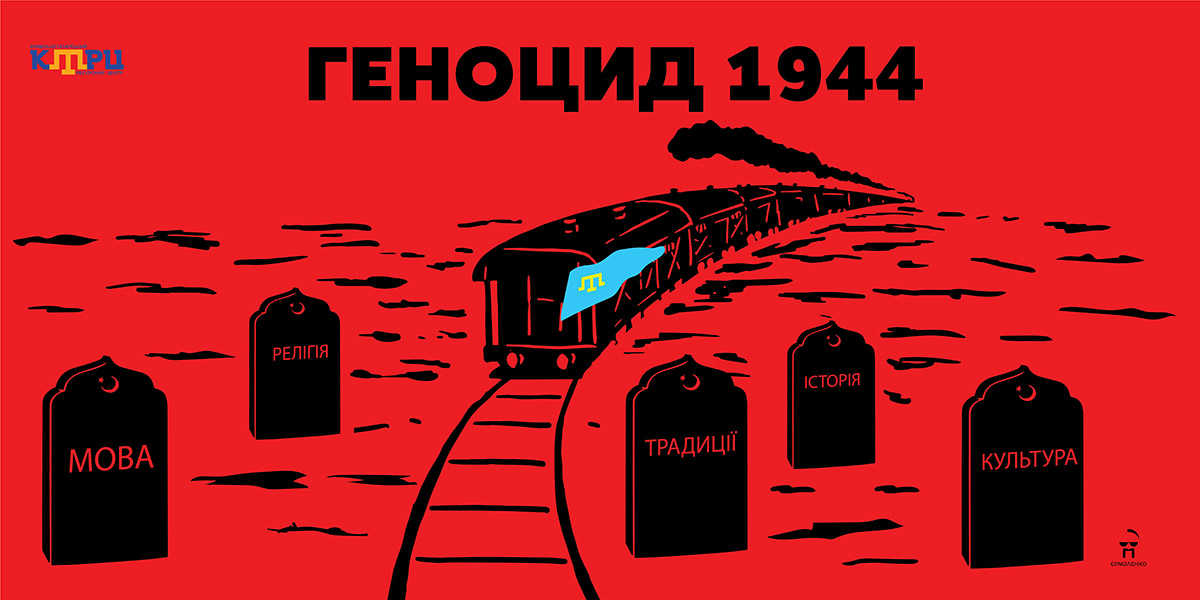On May 18, Ukraine and the world commemorate the victims of the Genocide of the Crimean Tatar People
On May 18, 1944, the first echelon of Crimean Tatars was sent to Central Asia from the peninsula. In total, more than 180,000 people were deported. The operation was carried out by NKVD troops numbering 32,000 people.
The Crimean Tatars were given from a few minutes to half an hour to gather. Then they were taken to the railway stations by trucks. From there, in echelons, in tightly closed freight cars – to the places of exile – to Uzbekistan and the neighbouring regions of Kazakhstan and Tajikistan. Small groups went to the Mari Autonomous Soviet Socialist Republic, the Urals, and the Kostroma region of Russia. On the way, people were rarely and poorly fed, the dead were buried near the railway track, or not buried at all.
Among the reasons for the eviction, the USSR authorities cited the desertion of the Crimean Tatars from the Red Army, cooperation with the Nazis, and the massacre of Soviet partisans.
For more than 20 years, the communist regime denied the criminal nature of its actions. In 1967, the Verkhovna Rada of the USSR recognised the groundlessness of the total accusation against the Crimean Tatars. However, unlike other “punished peoples”, they were not given the right to return to Crimea. Only in 1989, the Soviet parliament declared deportation illegal and criminal.
Genocide witness Enver Abibullayev (born on March 10, 1942 (actually March 15, 1939) in the village of Ai-Serez) recalled:
“On May 18, 1944, early in the morning, it was still dark, and the military broke into the house – there were two officers, and our father’s relative was with them. She lived in Nyzhniohirsk, so she understood the Russian language. She explained to us that we and all the Crimean Tatars were moving out. They warned us to take the most necessary things and to gather quickly. All of us, five children, slept under a common blanket, mother – separately with her younger sister. They announced eviction orally and with no official document read.
Regarding the decision of the State Defense Committee No. 5859 ss. “On the Crimean Tatars” of May 11, 1944, where special emigrants were allowed to take their personal belongings, clothing, household equipment, dishes and food in the amount of up to 500 kg per family, we were not informed.
Our gathering point was near the village cemetery where the American Studebakers were. Each car was loaded with 8-9 families. The evicted were taken to the railway station in Feodosia. A soldier with a machine gun accompanied us to the station, sitting in the rear right corner of the Studebaker.
At the railway station in Feodosia, we were immediately loaded into the cars of the echelons standing there. The wagons were intended for the transportation of livestock, they were specially converted for those evicted. Bunk beds were made from fresh boards for more capacity. We settled on the shelf near the window, Mother, on the move, in her arms completely pushed her little sister out of this window when it was necessary. Later, until her death, she shuddered with fear at the mention of it. For the adult toilet, a burlap fence was made in the middle of the car, where the floor was perforated. We children never used that toilet. There were lots of people in the carriage, some women were ashamed to go to that toilet, and in the parking lots, they went under the echelons as needed.
There were no conditions for cooking in the echelons. Women prepared the dough and in the parking lots, hastily making a hearth out of stones, baked it in a pan. How long the train will be at the stop was not announced. They were just about to start baking, and then the accompanying soldiers shouted: “On the wagons!!!” People grab hot pans with half-baked dough and run to their cars, they will finish baking at the next parking lot. In general, everyone ate as much as they could while traveling, there was no organized food from the state.
There were no conditions for cooking in the echelons. Women prepared the dough. And in the parking lots, hastily making a fire out of stones, baked it in a pan. How long the train will be at the stop was not announced. They were just about to start baking, and when the accompanying soldiers shouted: “To the wagons!!!” People grabbed hot pans with half-baked dough and ran to their cars: they will finish baking at the next parking lot. In general, everyone ate as much as they could while travelling as there was no organised food from the state.
There was no mention of State Defense Committee Decree No. 5859. There was no sanitary or medical service. On the way, people got sick, there were also deaths. The corpses of people in parking lots were carried out and left without burial.
We were on the road for 15 days. On June 3, they arrived at the “Asaka” station in the city of Leninsk, Andijan region, UzRSR. We were unloaded at this station, where we lived under a canopy for three days. Even before our arrival, we were distributed to districts and collective farms, but no one came to pick us up, so we had to stay at the station for so long. It turns out that the Moscow super fascism while evicting us, slandered us as cannibals, so no one wanted to come after us, no one wanted to be eaten.”
After the occupation by the troops of the Republic of Crimea in 2014, the Crimean Tatars again experienced repression and persecution for not accepting and resisting the Russian occupation. According to the head of the Mejlis of the Crimean Tatar people, Refat Chubarov, there are currently about 120 Crimean Tatars among political prisoners in the Russian Federation.
